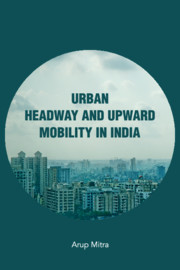Book contents
- Frontmatter
- Contents
- List of Tables
- Acknowledgements
- 1 Analytical Frame
- 2 Assessing the Quality of Cities and Towns
- 3 New Patterns and New Strategies in Indian Urbanization
- 4 Growth, Informal Sector Employment and Poverty
- 5 Upward Mobility of the Disadvantaged Sections
- 6 Erosion of the Caste Factor?
- 7 Changes in a Cultural Variable
- Bibliography
- Index
4 - Growth, Informal Sector Employment and Poverty
Published online by Cambridge University Press: 30 April 2020
- Frontmatter
- Contents
- List of Tables
- Acknowledgements
- 1 Analytical Frame
- 2 Assessing the Quality of Cities and Towns
- 3 New Patterns and New Strategies in Indian Urbanization
- 4 Growth, Informal Sector Employment and Poverty
- 5 Upward Mobility of the Disadvantaged Sections
- 6 Erosion of the Caste Factor?
- 7 Changes in a Cultural Variable
- Bibliography
- Index
Summary
Introduction
Because of the agglomeration effects and rise in total factor productivity growth, economic growth is expected to be positively associated with urbanization. Also, in the process of urbanization, employment opportunities for all sections of the society including the unskilled and semi-skilled variety of the workforce are expected to grow through several forward and backward linkages between the dynamic sectors and the informal sector. In other words, even the activities that were residual in nature to begin with may acquire productivity gains in the process of urbanization and, thus, offer better levels of living to the workers located in the lower echelons. Since the cost of providing services in urban areas is usually less than that in rural areas (as a result of agglomeration effects), the decline in the incidence of urban poverty is likely to take place at a higher pace with rapid urbanization. Even the rural poor benefit in the process of urbanization through inter-linkage effects.
Growing inequality and increasing poverty are likely to have a direct relationship. Given the level of per capita income if inequality rises, it results in an increase in poverty. However, when both growth and inequality rise simultaneously, the poverty outcome is a bit uncertain. The beneficial effects of growth on poverty tend to get neutralized by the adverse effects of increasing inequality on poverty and thus the net decline in poverty can be quite modest. However, at higher levels of growth when inequality tends to decline, poverty is certain to fall. As economic growth, particularly its compositional change, is expected to bring in rapid urbanization, one may therefore infer that at higher stages of urbanization, the overall poverty is also expected to decline substantially. Since urbanization can offer opportunities to rural migrants to escape poverty—more so because of the agglomeration effects in large human settlements—the relationship between urbanization on the one hand, and rural and urban poverty on the other, can be an inverse one even at the lower levels of urbanization. If rural–urban migration is directed to large cities and much of the economic growth also originates from large cities, the decline in poverty and rise in urbanization can occur simultaneously.
- Type
- Chapter
- Information
- Urban Headway and Upward Mobility in India , pp. 64 - 90Publisher: Cambridge University PressPrint publication year: 2020



